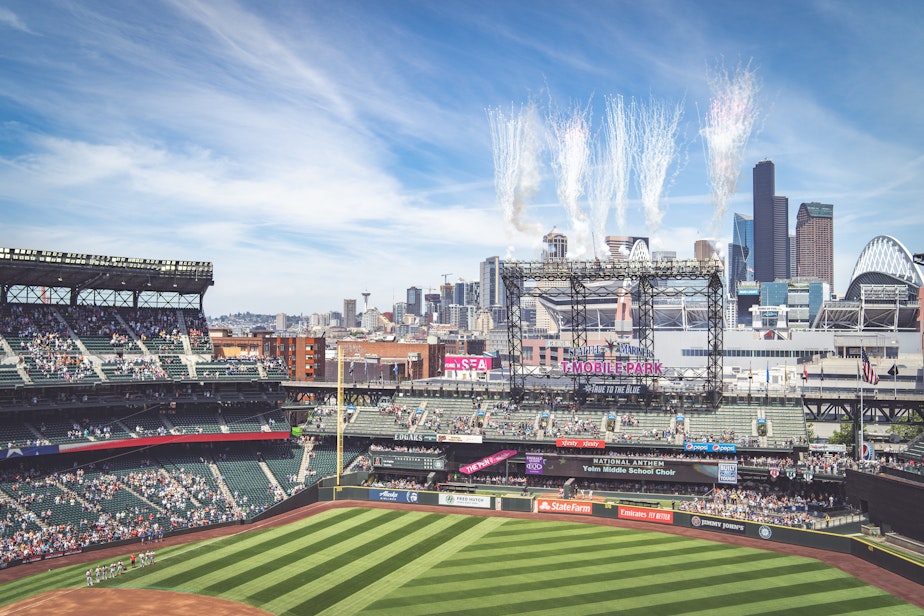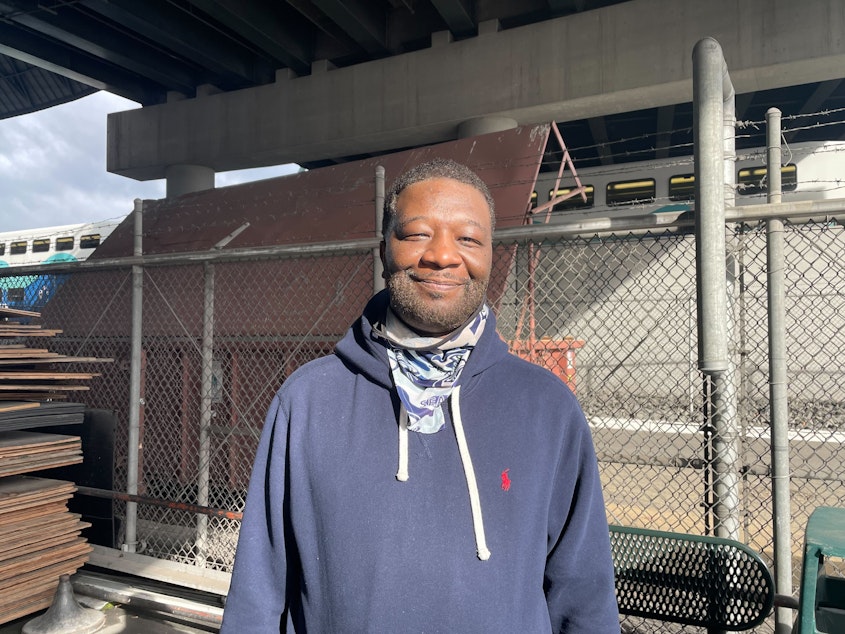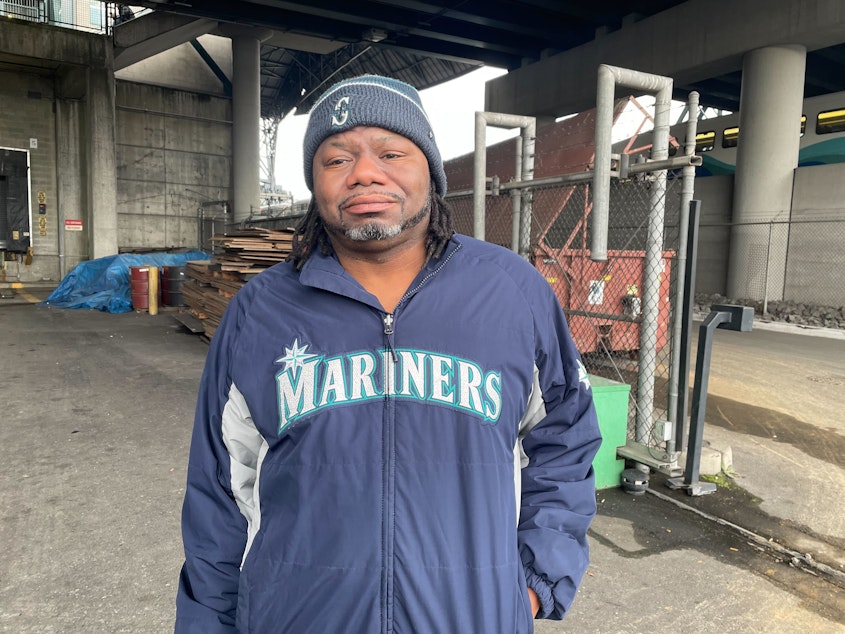'It's been a rough two years.' Seattle MLB stadium workers have some demands of their own

It’s been 96 days since the Major League Baseball lockout began. Last week, Major League Baseball Commissioner Rob Manfred canceled the first two series of the regular season.
Now, the earliest the baseball season will start is the second week of April. The financial impact of the delay is already being felt across each stadium.
“Any Seattle area HS teams need an assistant coach?” Casey Sadler, Mariners pitcher, tweeted as the lockout wears on.
But baseball players are not the only one’s feeling the impact. The delay to the season is felt throughout Seattle's T-Mobile Park.
Stadium employees returning from the off season say they are concerned about health insurance coverage, bleeding through their savings, and some not qualifying for unemployment.
As negotiations persist, workers represented by Unite Here Local 8, have demands of their own.
They are asking for a fair contract for the baseball employees, a $22 minimum wage similar to the workers at nearby Lumen Field, health care coverage for employees that lost coverage during the lockout and pandemic, and they also want tip lines at all concessions.
Sponsored
Unite Here Local 8, the union that represents the workers won a deal to get workers at Lumen field a $22 minimum wage.
"You have to fight and keep fighting to get a livable wage"
“It's been a rough two years after the pandemic, now it's a lockout," said Otis Williams, a lead cook at T-Mobile Park.
On Friday, stadium employees arrived for a mandatory training session: roll call. Williams, says he’s worked at T-Mobile Park for nine years. And that if returning staff want to keep their job they have to show up to the trainings.
Williams lives in Kent, Wash. with his sister. He traveled up to Seattle just for the training hoping to get some information on when he would start work.
Sponsored

“I'm concerned about paying rent, taking care of my family, and actually eating food,” he said.
Williams works hourly, he says he makes $24.10, but the cost of living keeps going up.
“I lived in Seattle last year and because of the non-livable wages, we had to move further out.”
During the office season, baseball stadium employees find work at other sports arenas or complexes like Lumen Field or Climate Pledge arena. When a new season begins, so does the new job.
Sponsored
For Williams, the Mariners is his primary job and he says it might be time to find something else. He’s not done fighting for more though.
“I tell everyone, and I definitely have to tell my children that you have to fight,” he said. "You have to fight and keep fighting to get a livable wage to make sure everyone is OK, including yourself.”
At roll call, Williams was not alone in a fight for higher minimum wage for all.
"Not just a fight between wealthy owners and wealthy players"
Matt Cavanaugh, an employee for the Diamond Club at T-Mobile Park shares the view. Cavanaugh started last season and came back this year to work for the Diamond Club. He says he preferred a different department this time.
Sponsored
“My top concern is this training day being the only shift that we work the entire season the entire year,” Cavanaugh said.

The irony of showing up to a training day for a non-existent start day is not lost on employees. We all talk for a while in the noisy smoke break area behind the stadium.
Cavanaugh says that as the lockout continues he is concerned about job stability.
“Right now I'm fine,” he said. “But there's always the concern that in this climate that could go at any time.”
Sponsored
He explains that working seasonal shifts in hospitality comes with this kind of uncertainty. He says the MLB lockout on top of the pandemic amplifies his concern for job loss.
Matt says he’s in solidarity with the athletes. But that the picture painted by the media has it all wrong. He says this is not just a fight between wealthy owners and wealthy players.
“Sometimes it's millionaires and billionaires against the working class,” he said.
Cavanaugh says he knows that there are minor league players who make as much money or less than he does in a given season.
"Most minor leaguers make less than $15,000 per year and won't receive their next paycheck until April," Harry Marino told ESPN last year. Marino is the executive director for Advocates of Minor Leaguers and a former minor league player himself.
Last year, Major League Baseball announced that they would start providing housing to minor league players following their calls for livable wages.
“We just want to get back to work and hope the owners give the players what they need and come out with something positive so we can all live on for another day to eat,” Otis Williams said.
The vibe of the game
Derrick Thomas is a hot cook for the Diamond Club. Thomas has worked at the stadium for many years. From Sound Seafood to Sweets, he says he’s been in almost every department in the building. This upcoming season would be his sixth year.
Thomas showed up to roll call decked out in Mariners gear. He wore an embroidered beanie, a striped polo with the logo stitched in the corner, and a navy Mariners windbreaker to complete the look.

This year, roll call was different, he said. It wasn’t just in one room and instead there were different training stations set up for employees to visit.
“I like the way they did it this year, keeps you awake,” he said.
Thomas said employees walked the bases this year and they were also given gifts. He showed me the Ken Griffey, Jr. bobblehead inside a Mariners bag he received.
Thomas loves working at the stadium and he was looking forward to starting the season. He loves the vibe of the game and the people that attend.
“It's not only affecting the baseball players, but it's affecting us as well,” Thomas said. “If there's pretty much no baseball then we don't have a job.”
Ahead of the season, employees prepare for opening day. Thomas says that prep includes cleaning, looking over menus and adjusting them. But due to the MLB lockout there is no official opening day.
In an email, Rebecca Hale, the Senior Director, Public Information for the Seattle Mariners said that once there’s a date for Opening Day, event staff will be notified about their schedules for the start of the season.
Thomas says he has not heard anything from his employers, not about a start day, or words of encouragement.
“Nobody talks to us about what's going on or anything,” he said. “Most of the information that we get is from the news. There's no one here in contact with us saying ‘Hey, well, this is what's going on you guys hold on tight.’ It just is what it is.”
Mariners support would be nice, but fans would be better.
“We love our fans,” Williams said.
Williams echoes similar statements passed around the negotiation press conferences. MLB Commissioner Rob Manfred and Tony Clark the executive director of the MLB Players Association, also underscore the importance of coming to a decision for the fans.
“We want our fans to know that we're doing everything possible to give them the best food and the best time coming for the Seattle Mariners,” Williams adds. “But they're underpaying us, and we need livable wages, so we can accommodate all fans.”
Longtime fans of the sport shudder at the memories of the lockouts of yore. When The World Series was canceled for the first time in 90 years. MLBPA went on strike in 1994-1995 following a salary cap attempt by the owners. It took months for the game to return.
As negotiations remain deadlocked, MLB and players union says they are still working toward a deal that works for everyone, including fans.
When ballparks were empty throughout the pandemic, MLB estimated that no fans meant a loss of $640,000 for each game.
Stadium employees who look to the fans throughout the negotiations say they’re also looking for support too.
“I think the fans appreciate us,” one employee shares. “And I feel like we play a big part of the coming to the ballpark environment.”
Not every employee was comfortable being on the record. Some feared retaliation or continued job loss if they spoke out. They looked to fans to speak out for them.
When I asked him if getting the support of the Mariners players is important to him, he told me would be nice, but ultimately the fans matter most.
He tells me that fans should take an interest in everyone that works at the stadium, not just the players.
“How can you have a home field when you don't even communicate with the whole stadium?” they said. “If you don't recognize what's going on in your home field, it's not your home field.”
KUOW reached out to Sodexo Live! (the company that manages food service at T-Mobile Park) via phone and email as part of this story, but still not have heard back.




